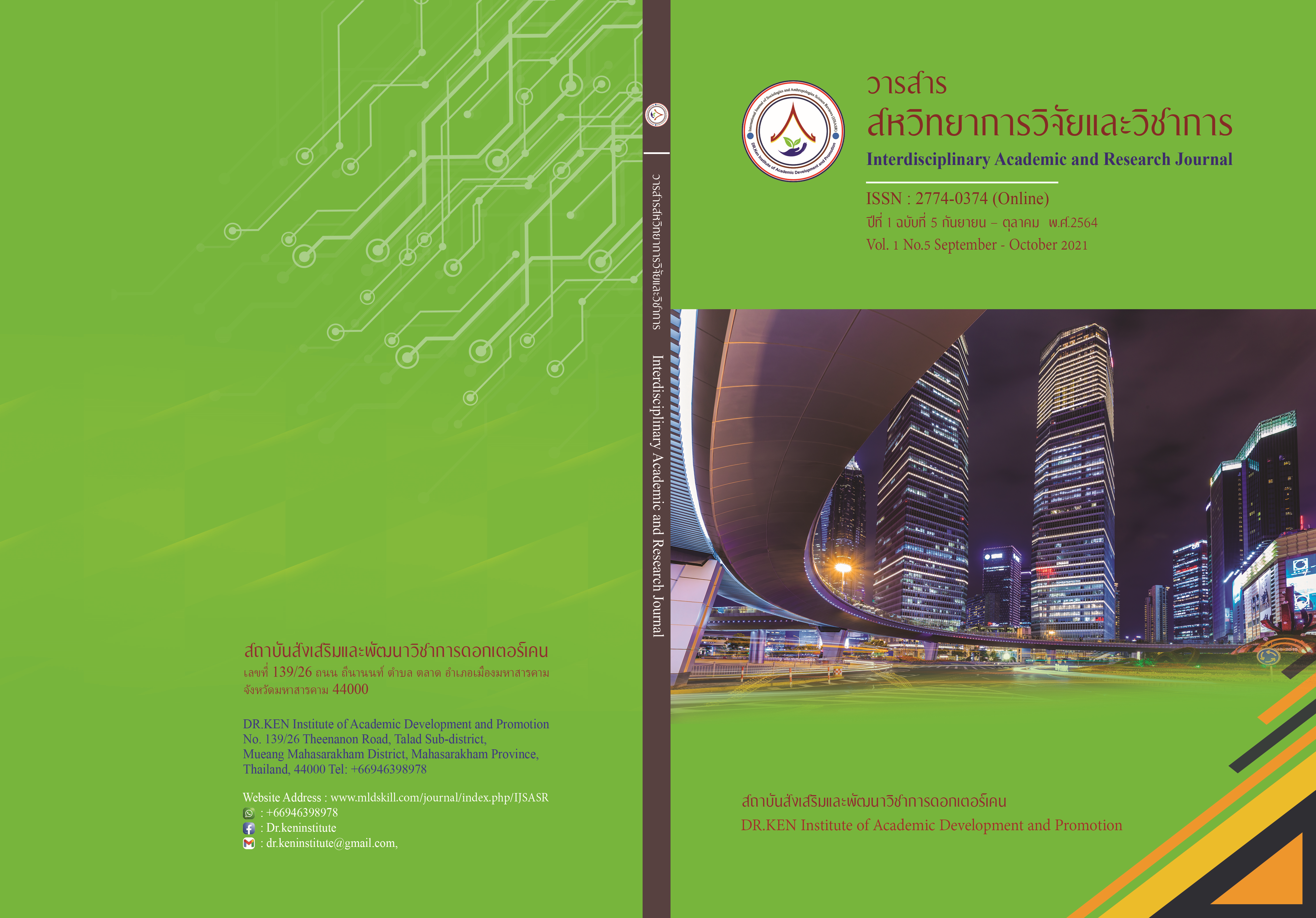Solving Integrated Social Problems using the Layperson Principle
DOI:
https://doi.org/10.14456/iarj.2021.25Keywords:
Problem Solving, Society, Integration, Higher Samatha PrincipleAbstract
In this modern era, moral disgrace lacks moral virtue. Affects the development of mental and intellectual prosperity of people in society. The development of people in community society is a delicate matter. At present, the governance of the country is trying to make Thai society a modern society. have modern communication tools Electronic devices such as mobile phones that makes people in Thai society today interact in the family and social interaction “Society of people bowing their heads” can talk to each other all the time. We all understand that the world is spinning very fast. need to develop to keep up with the changing world Methods for solving conflicts in today's society will see clear similarities and differences. Conflict about religious principles Political, governance, economic and social concepts, including the way of thinking of people in the organization in the nation's society The so-called controversy needs to be resolved in a systematic way. according to the principles and methods that some peaceful thinkers have framed that some political scientists have framed that the clergy have framed The development of Thai society that is all Buddhists should integrate Buddhist principles and apply them to benefit. to develop in Thai society Growing at the same time both materially and spiritually Buddhism integration is the application of the Buddha's dharma principles to suit the situation. Along with the principles and methods that the Buddha had put and practiced during the Buddha's time. Buddhist Methods for Solving Conflict Problems Using the Framework of the Supreme Patriarch 7 A Study of Applied Disciplines Yepuisika Discipline It is a solution to conflicts, the Buddha used to solve problems in the Buddha's time effectively. Therefore, it has been integrated into a case study in the application of conflict resolution that occurs in today's society.
References
เกรียงศักดิ์ เจริญวงศ์ศักดิ์. (2546). การคิดเชิงสังเคราะห์. กรุงเทพฯ: บริษัทซัคเซส มีเดีย.
กนก แสนประเสริฐ. (2559). หลักการบริหารงานสมัยใหม่กับหลักการบริหารงานเชิงพุทธศาสตร์เพื่อความมั่นคงแห่งพระพุทธศาสนา. นครปฐม : สำนักงานพระพุทธศาสนาแห่งชาติ.
กัลยา ตากูล. (2550). การศึกษาการจัดการเรียนการสอนและสภาพแวดล้อมเพื่อส่งเสริมทักษะ การคิดและกระบวนการคิดแก้ปัญหาอนาคตของนักเรียนระดับชั้นมัธยมศึกษาปีที่ 3 : กรณีศึกษาโรงเรียนวชิราวุธวิทยา. วิทยานิพนธ์ปริญญามหาบัณฑิต : จุฬาลงกรณ์มหาวิทยาลัย.
คชาภรณ์ คำสอนทา. (2557). การศึกษากระบวนการและขั้นตอนการระงับอธิกรณ์ในพระพุทธศาสนาเถรวาท. วิทยานิพนธ์ปริญญาโท สาขาวิชาสันติศึกษา : มหาวิทยาลัยหาจุฬาลงกรณราชวิทยาลัย.
จักรี ศรีจารุเมธีญาณ. (2561). วัฒนธรรมทางการเมืองกับประชาธิปไตยของไทย. วารสารวิชาการแพรวากาฬสินธุ์ มหาวิทยาลัยกาฬสินธุ์. 5 (3),148-137.
จำนงค์ อภิวัฒนสิทธิ์. (2548). สังคมวิทยาตามแนวพุทธศาสตร์. กรุงเทพฯ : สำนักพิมพ์มหาวิทยาลัย เกษตรศาสตร์.
จิรายุ อิศรางกูร ณ อยุธยา. (2561). ตามรอยพ่อ ชีวิตพอเพียง – สู่การพัฒนาที่ยั่งยืน.กรุงเทพฯ : อมรินทร์พริ้นติ้งแอนด์พับลิชชิ่ง.
จุรีวัลย์ ภักดีวุฒิ. (2556) คุณลักษณะของสถาบันการเงินชุมชนที่มีคุณภาพและประสบความสำเร็จ. วารสารมนุษยศาสตร์และสังคมศาสตร์ มหาวิทยาลัยมหาสารคาม, 32 (3), 117-131.
ทิศนา แขมมณี. (2548). รูปแบบการเรียนการสอนทางเลือกที่หลากหลาย. (พิมพ์ครั้งที่ 3). กรุงเทพฯ: จุฬาลงกรณ มหาวิทยาลัย.
ประเวศ วะสี (2554). ประชาชนปฏิรูปประเทศไทย. นนทบุรี : สำนักงานปฏิรูป.
ประเวศ วะสี. (2556). ปฏิรูปโครงสร้าง 3 อย่าง. นนทบุรี : สำนักงานประสานการพัฒนาสังคมสุขภาวะ (สปพส.) สำนักงานคณะกรรมการสุขภาพแห่งชาติ.
ประสิทธิ์ กุลบุญญา. (2557). ความขัดแย้งและการจัดการความขัดแย้งตามหลักพระพุทธศาสนา. วารสารมนุษยศาสตร์และสังคมศาสตร์, มหาวิทยาลัยราชภัฏอุบลราชธานี. 5 (1), 18-39.
ปราณี เกษมสันต์. 2550. ความหมายของสังคม. มหาวิทยาลัยมหาจุฬาลงกรณ์ราชวิทยาลัย วิทยาเขตแพร่.
พระธรรมกิตติวงศ์ ทองดี สุรเตโช. (2551). พจนานุกรมเพื่อการศึกษาพุทธศาสน์ : คำวัด : อธิบายศัพท์และความหมายที่ชาวพุทธควรรู้. กรุงเทพฯ : สถาบันบันลือธรรม.
พระพรหมคุณาภรณ์ (ป.อ.ปยุตฺโต). (2551). พจนานุกรมพุทธศาสตร์ ฉบับประมวลธรรม. (พิมพ์ครั้งที่ 16). กรุงเทพฯ: เอส. อาร์. พริ้นติ้งแมสโปรดักส์.
พระมหาดวงเด่น ฐิตญาโณ (ตุนิน) และคณะ, พระปลัดสมชาย ปโยโค (ดำเนิน) พระมหาดนัย อุปวฑฺฒโน (ศรีจันทร์) และ พระวีระศักดิ์ ชยธมฺโม (สุวรรณวงศ์). (2561). การบูรณาการองค์ความรู้หลักการและ วิถีปฏิบัติตามแนวทางศาสนา เพื่อการพัฒนากระบวนการสร้างสันติภาพ. วารสารสันติศึกษาปริทรรศน์มจร. 6 (2), 474-489.
พระมหาประกาศิต อาจารปาลี. (2554). การสร้างความปรองดองระหว่างศาสนาในพุทธธรรมกับการพัฒนาสังคมและเศรษฐกิจ. พระมหาหรรษา ธมฺมหาโส บรรณาธิการ. กรุงเทพฯ: บริษัท 21 เซ็นจูรี่จำกัด.
พระศรีคัมภีรญาณ. (2558). พุทธวิธีแก้ปัญหาความขัดแย้งโดยกรอบแห่งอธิกรณสมถะ 7 : ศึกษาแนวการประยุกต์ใช้สัมมุขาวินัย เยภุยยสิกาวินัย. สารนิพนธ์: มหาวิทยาลัยมหาจุฬาลงกรณราชวิทยาลัย.
มานิต ไชยกิจ. (2557). รวบรวมความรู้การบูรณาการจากเอกสาร – สำนักบริการวิชาการ, คณะกรรมการการอุดมศึกษา. [Online]. สืบค้นเมื่อ 4 สิงหาคม 2564. จาก https://asl.kpru.ac.th › main › contents.
ราชบัณฑิตยสถาน. (2524). พจนานุกรมศัพท์สังคมวิทยา อังกฤษ -ไทย ฉบับราชบัณฑิตยสถาน. กรุงเทพฯ: ราชบัณฑิตยสถาน.
วิกิพีเดีย สารานุกรมเสรี. (2559). สมถะ. [Online]. https://th.wikipedia.org/wiki/สมถะ
สำนักงานคณะกรรมการพัฒนาการเศรษฐกิจและสังคมแห่งชาติ. (2560). แผนพัฒนาเศรษฐกิจและสังคม แห่งชาติ ฉบับที่ 12. กรุงเทพฯ : สำนักงานคณะกรรมการพัฒนาการเศรษฐกิจและสังคมแห่งชาติ.
สุกัญญา ศรีสาคร. (2547) การพัฒนาความสามารถในการคิดแก้ปัญหาของนักเรียนชั้นมัธยมศึกษาปีที่ 2 ที่จัดการเรียนรู้โดยใช้เทคนิคการคิดแก้ปัญหาอนาคต. กรุงเทพฯ: มหาวิทยาลัยศิลปากร.
Beane, J. (1991). The Middle School: The natural home of integrated curriculum. Integrating the Curriculum, 9-13.
Popenoe, David. (1993). Sociology. New Jersey: Prentice-Hall.
Souillard, Alain; & Kerr, Anthony. (1990, April). Problem Solving Activities for Science and Technology Students. English Teaching Forum. 28-32.
Spencer, Herbert (1903). The principles of ethics. London : Williams and Norgate.
Downloads
Published
How to Cite
Issue
Section
License
Copyright (c) 2021 Interdisciplinary Academic and Research Journal ISSN 2774-0373 (Online)

This work is licensed under a Creative Commons Attribution-NonCommercial-NoDerivatives 4.0 International License.
Copyright on any article in the Interdisciplinary Academic and Research Journal is retained by the author(s) under the under the Creative Commons Attribution-NonCommercial-NoDerivatives 4.0 International License. Permission to use text, content, images, etc. of publication. Any user to read, download, copy, distribute, print, search, or link to the full texts of articles, crawl them for indexing, pass them as data to software, or use them for any other lawful purpose. But do not use it for commercial use or with the intent to benefit any business.
















.png)


